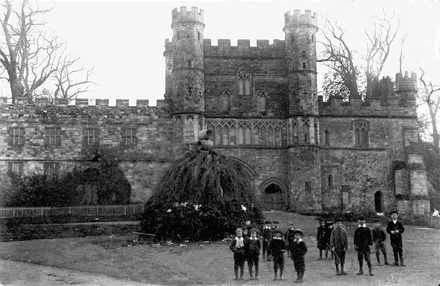This section features 1900 till 1949. The 1900s are also cut up into the following sections:
1900s
1950s
1960s
1970s
1980s
1990s
Bonfire Ban!
In 1906, Sussex County Council decided the ban Bonfires near public highways. This created a major problem as Battle Bonfire was on the Abbey green, which was near a public highway. Due to this, Battle Bonfire Boyes `disbanded` in a way, but it was more a case of the core members changing the name and location to Battle Hill Bonfire Boys. Battle Hill was a bit more out of town, but was away from the Public Highway, thus it could carry on. up to 1919, this was still the case. But then the Law was changed and the group was renamed again as Battle & Battle Hill Bonfire Boys. During the 50s, it was finally restored to its rightful name of Battle Bonfire Boys.
Put that Ruddy Light Out!
During the Blackouts (1939 to 1945), most bonfire Societies were forced to stop all together since the bonfires were large sources of light that would attract the Luftwaffe (German air force). This did not stop Battle, and with permission, a single candle was allowed to be placed on the Abbey Green each Bonfire Night as well as the members giving the chant, to insure not even the German air force would stop Battle Bonfire Boys doing what they do and keeping the Society alive.
 Making Torches Pre-1939 at Wellington Gardens, Including Mr. Reg Wenham, Mr. (Unknown), Mr. (Unknown) & Mr. George Prodger. |
 A Gurt Bonfire at the Abby Green Pre-1939s Photo, believed of the Battle Bonfire, with Kids posing in front |
No more Drill Hall
The Battle Drill Hall had been the location for the Bonfire`s judging of fancy dress contests and it worked as a central location which was used as an assembly point. However, in 1957, the Drill Hall was sold to the GPO, which meant trouble for the society. While permission was asked to use the hall, a secondary plan was needed but it became pretty clear that Battle didn`t HAVE a public hall. In the end, the judging happened at the market square.